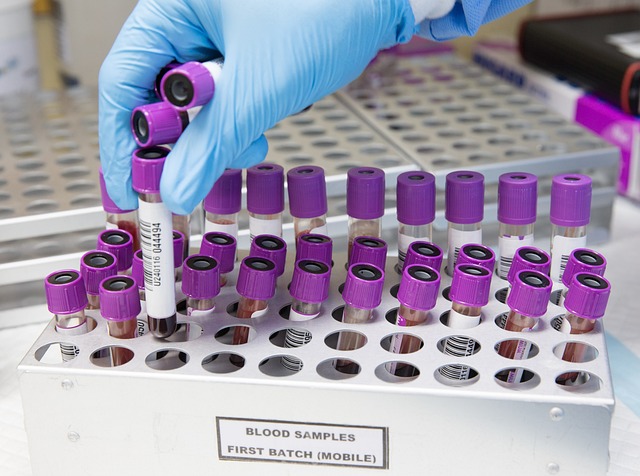A full body blood test is a powerful diagnostic tool that provides insights into overall health by analyzing various blood components, including cells, biomarkers, and nutrients. Regular tests can detect potential health issues early, such as cardiovascular risks or anemia, allowing for timely interventions and proactive wellness management. Key markers like blood sugar, cholesterol, red/white blood cell counts, C-reactive protein, and thyroid-stimulating hormone (TSH) help healthcare professionals assess diverse conditions holistically. Interpreting test results is crucial for understanding health status, prompting appropriate actions or further investigations if abnormalities are detected. Regular monitoring ensures early detection of developing health concerns.
Discover the power of a professional full body blood test – a comprehensive assessment that can detect potential health issues early. This in-depth analysis goes beyond basic screenings, offering insights into your overall well-being by examining various markers. Learn how these tests can identify hidden risks, from cardiovascular health to nutrient deficiencies. Understand when and why to consider one, explore common indicators, and navigate the results for proactive healthcare.
- Understanding Full Body Blood Tests: What They Entail and Their Benefits
- When to Consider Getting a Comprehensive Blood Panel
- Common Markers in Full Body Blood Tests: What to Look For
- Interpreting Results and Next Steps After a Full Body Blood Test
Understanding Full Body Blood Tests: What They Entail and Their Benefits
When to Consider Getting a Comprehensive Blood Panel
Many people often overlook the importance of regular full body blood tests, but they can be a powerful tool for early detection and maintenance of overall health. Consider getting a comprehensive blood panel if you’re experiencing any unusual symptoms or have concerns about your well-being. This is especially true if you’re middle-aged or older, as age-related health issues may start to emerge.
Additionally, certain life events or factors can signal the need for a full body blood test. For instance, significant weight loss or gain, chronic fatigue, unusual bruising or bleeding, or even subtle changes in energy levels and sleep patterns could indicate underlying health problems. As part of preventive care, consulting with a healthcare professional about running a comprehensive blood panel is a proactive step towards managing your long-term health effectively.
Common Markers in Full Body Blood Tests: What to Look For
Full body blood tests are a comprehensive way to assess your overall health by examining various markers in your bloodstream. These tests provide valuable insights into different physiological systems and can help detect potential issues early on, even before symptoms appear. Common markers include a range of substances like enzymes, hormones, proteins, and cells.
For instance, looking at blood sugar levels can offer clues about metabolic health, while a complete blood count (CBC) provides information on red and white blood cell counts, helping to identify anemia or infections. Lipid panels measure cholesterol and triglycerides, crucial for cardiovascular health, while liver function tests check for enzymes that indicate liver damage. Additionally, markers like C-reactive protein (CRP) can suggest inflammation, and thyroid-stimulating hormone (TSH) regulates metabolism. By analyzing these common markers, healthcare professionals gain a holistic view, enabling early detection and management of various health conditions.
Interpreting Results and Next Steps After a Full Body Blood Test
After completing a full body blood test, interpreting the results is crucial for understanding your overall health status. Each result provides insights into specific aspects of your body’s functionality. Elevated or low levels of various markers can indicate potential health issues or highlight areas that require attention. For instance, abnormal cholesterol levels might suggest cardiovascular risks, while unusual red blood cell counts could point to anemia or infection. A comprehensive report will detail these findings, allowing individuals to take appropriate actions.
The next steps depend on the test outcomes. If any abnormalities are detected, further investigations may be recommended. This could involve additional testing, lifestyle changes, or consulting specialists. For example, if a full body blood test reveals inflammation markers, a doctor might suggest reducing inflammatory foods in the diet or prescribing anti-inflammatory medications. Regular monitoring and follow-up tests can then track improvements and ensure early detection of any developing health concerns.
A full body blood test is a powerful tool for proactive health management. By providing a comprehensive view of your overall well-being, these tests can detect early signs of potential issues, allowing for timely interventions. Regular monitoring through such panels empowers individuals to take charge of their health and make informed decisions. With proper interpretation, you can identify subtle changes and ensure optimal vitality. Remember, preventive care is key, and a full body blood test could be the first step towards a healthier future.
